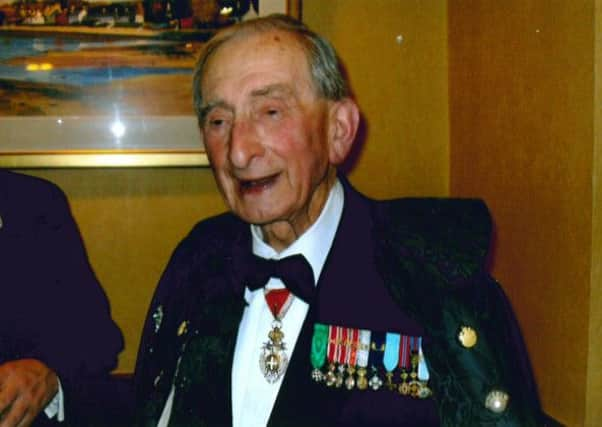Obituary: Count Andrew McMillan, Baron of Cleghorn


Andrew McMillan was the investment manager who used his considerable personal resources to indulge in colourful chivalry and in unsung philanthropy. A monarchist devoted to history, heraldry, armoury and tradition, he gained an ancient Scots barony as well as a Portuguese comity.
He was a member of numerous European orders, and presented an inspiring sight when fully decked out at formal functions.
Advertisement
Hide AdAdvertisement
Hide AdExactly what spurred Andrew McMillan into chivalry is now not known, for he never married, had no near family relations, and outlived his friends from early life. The only son of prosperous Scottish parents, he was schooled in Switzerland, Moffat and Sedbergh, thriving in the austere regime of the Cumbrian public school and retaining a lifelong affection for it as well as proving a generous benefactor.
War interrupted studies at the University of Edinburgh. He volunteered for the Royal Engineers, working through the Second World War in bomb disposal.
After demobilisation, the portfolio of business interests he created brought him a steady income, allowing him to indulge his great passion for collecting.
He created two collections in his lifetime: first an array of double rifles, mainly Holland & Holland Royals; and after disposing of these in the 1980s, he turned his skills to rare watches and clocks. McMillan is, however, best remembered for his hobby of acquiring historic European titles and gaining entrees to orders of chivalry.
He was a knight of the Order of the White Eagle with Swords of Serbia, and held officership in the Italian Order of St Maurice & St Lazarus. From the Portuguese Duke of Braganza came his Order of St Michael of the Wing as well as the Order of Our Lady of the Conception of Vila Vicosa. Portugal was also the source of his being made a count.
His title of baron, however, firmly placed him in Scotland. He gained the ancient feudal barony of Cleghorn when it came on the market, thus becoming baronial successor to Sir Allan Lockhart, noted as baron of Cleghorn in 1441.
In 1970, in his rifle-collecting years, he was introduced to the Worshipful Company of Gunmakers of the City of London. His feeling for heritage matched the Gunmakers’ history of 330 years, and it was not long after election to the Livery in 1971 that he was invited to join the Court.
The company was not in good shape in the 1970s, having become run down by the relentless decline in numbers of gunmakers. With his analytical mind, and the ability to find answers to difficult questions, McMillan became the catalyst who brought modernisation.
Advertisement
Hide AdAdvertisement
Hide AdThe company recovered in confidence, reversing a decline in numbers and, thanks to his generosity, some of the ancient quarters and historic artefacts were refurbished. Among the restorations were many shields of arms, including his own, recorded through the Lord Lyon in Edinburgh.
Elected Master in 1981 and again in 1991, he served with distinction, and was honoured by being made Past Master Emeritus.
A private man whose charitable donations were generous and usually anonymous, McMillan’s philanthropy endowed a trophy and cash prize for annual presentation to the newly qualified young gunmaker whose work is considered the best in any year – and with the each year’s winner inscribed on an honours board.
Andrew McMillan was a convivial host who clearly enjoyed his long life. A lifetime traveller, he quietly claimed that he had visited “every country in the world except three” – and coyly remained silent on which three.
Into his 90s, he maintained an absorbing interest in current affairs, and greatly enjoyed spirited company.
He never married, but lived alone at his home in Lanark, looked after by his housekeeper, gardener and local helpers, and in recent times by a team of dedicated carers.